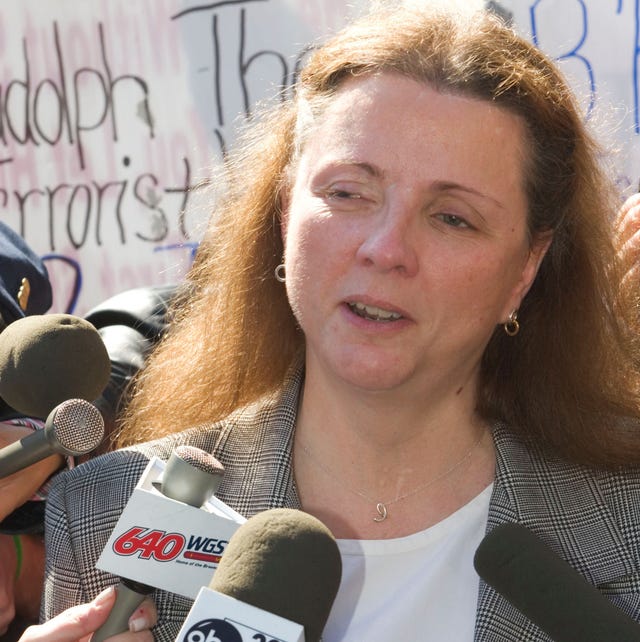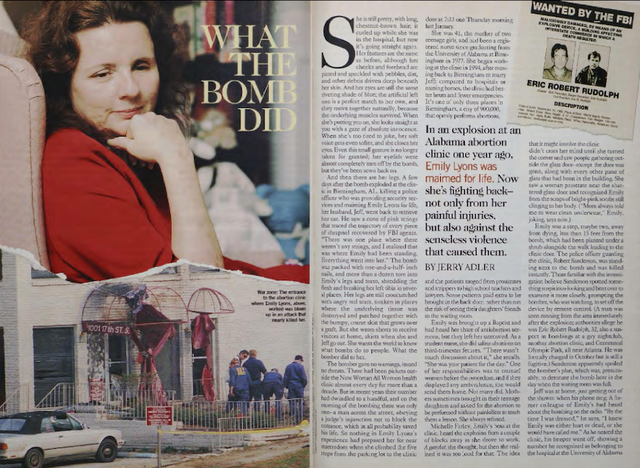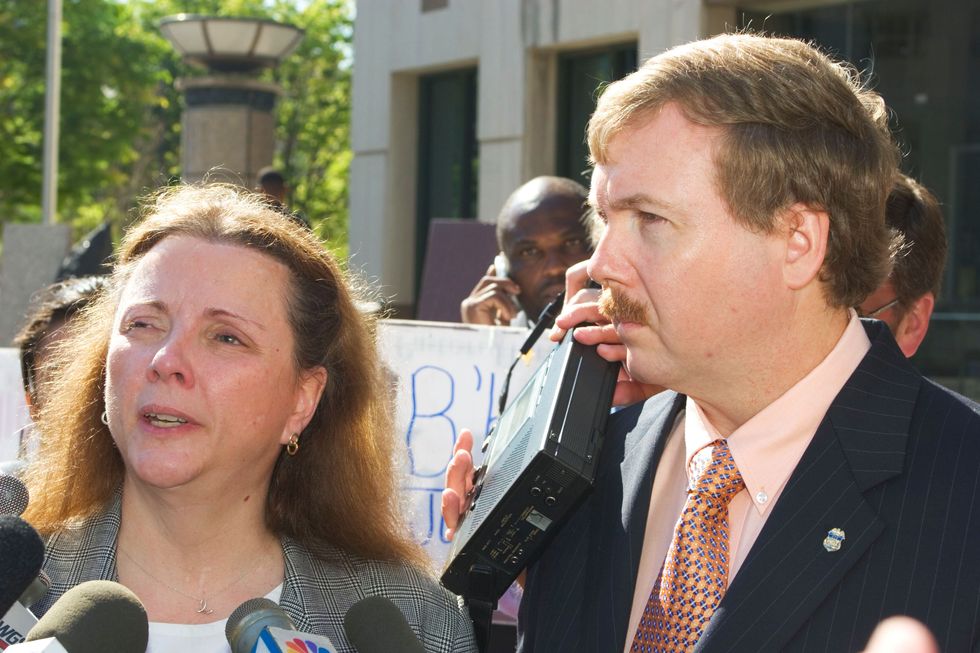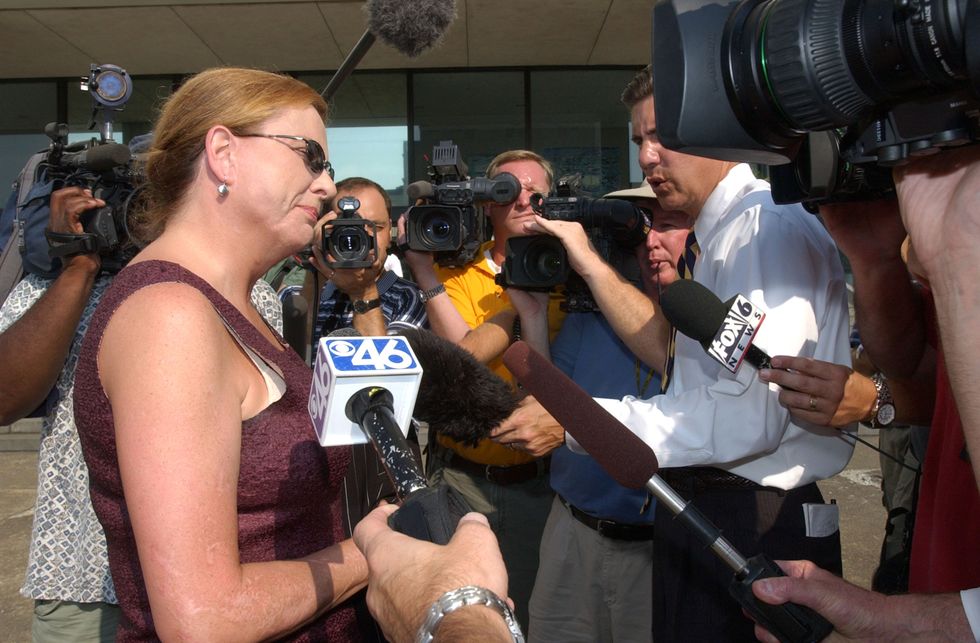In an explosion at an Alabama abortion clinic in 1998, Emily Lyons was maimed for life. But as revealed in this story from our archives, that didn’t slow her down in the fight against the senseless violence that caused her injuries.

On the morning of January 29, 1998, a bomb exploded outside of the New Woman All Women Clinic in Birmingham, Alabama. Emily Lyons, a nurse, was seriously injured during the explosion; Robert Sanderson, an off-duty officer who served as security for the clinic, was killed instantly. The bomber, Eric Rudolph, set off four bombs in the Atlanta area from ’96-’98, including one at the Olympic Games in ’96. He was caught in 2003, and two years later sentenced to life in prison. Lyons not only survived her ordeal but became an abortion-rights activist. This article, which contains graphic descriptions of the bombing, originally appeared in the January 1999 issue of Good Housekeeping. — Alex Belth, Hearst Archivist
She is still pretty, with long, chestnut-brown hair; it curled up while she was in the hospital, but now it’s going straight again. Her features are the same as before, although her cheeks and forehead are pitted and speckled with pebbles, dirt, and other debris driven deep beneath her skin. And her eyes are still the same riveting shade of blue; the artificial left one is a perfect match to her own, and they move together naturally, because the underlying muscles survived. When she’s putting you on, she looks straight at you with a gaze of absolute innocence. When she’s too tired to joke, her soft voice gets even softer, and she closes her eyes. Even this small gesture is no longer taken for granted; her eyelids were almost completely torn off by the bomb, but they’ve been sewn back on.
And then there are her legs. A few days after the bomb exploded at the clinic in Birmingham, AL, killing a police officer who was providing security services and maiming Emily Lyons for life, her husband, Jeff, went back to retrieve her car. He saw a cone of pink strings that traced the trajectory of every piece of shrapnel recovered by FBI agents. “There was one place where there weren’t any strings, and I realized that was where Emily had been standing. Everything went into her.” The bomb was packed with one-and-a-half-inch nails, and more than a dozen tore into Emily’s legs and torso, shredding the fleshing and breaking her left tibia in several places. Her legs are still crosshatched with angry red scars, sunken in places where the underlying tissue was destroyed and patched together with the bumpy, coarse skin that grows over a graft. But she wears shorts to receive visitors at home, skirts when she and Jeff go out. She wants the world to know what bombs do to people. What the bomber did to her.
Advertisement – Continue Reading Below
The bomber gave no warnings, issued no threats. There had been pickets outside of the New Woman All Women health clinic almost every day for more than a decade. But in recent years their number had dwindled to a handful, and on the morning of the bombing there was only one — a man across the street, obeying a judge’s injunction not to block the entrance, which in all probability saved his life. So nothing in Emily Lyons’s experience had prepared her for near martyrdom when she climbed the five steps from the parking lot to the clinic at 7:33 one Thursday morning last January.

She was 41, the mother of two teenage girls, and has been a registered nurse since graduating from the University of Alabama at Birmingham in 1977. She began working at the clinic in 1994, after moving back to Birmingham to marry Jeff; compared to hospitals or nursing homes, the clinic had better hours and fewer emergencies. It’s one of only three places in Birmingham, a city of 900,000, that openly performs abortions, and the patients ranged from prostitutes and strippers to high school teachers and lawyers. Some patients paid extra to be brought in the back door, rather than run the risk of seeing their daughters’ friends in the waiting room.
The bomber gave no warnings, issued no threats.
Emily was brought up Baptist and had heard her share of anti-abortion sermons, but they left her unmoved. As a student nurse, she did saline abortions on third-trimester fetuses. “There wasn’t much discussion about it,” she recalls. “She was your patient for the day.” One of her responsibilities was to counsel women before the procedure, and if they displayed any ambivalence, she would send them home. Not many did. Mothers sometimes brought in their teenage daughters and asked for the abortion to be performed without painkillers to teach them a lesson. She always refused.
Michelle Farley, Emily’s boss at the clinic, heard the explosion from a couple of blocks away as she drove to work. A gunshot, she thought, but then she realized it was too loud for that. The idea that it might involve the clinic didn’t cross her mind until she turned the corner and saw people gathering outside the glass door — except the door was gone, along with every other pane of glass that had been in the building. She saw a woman prostrate near the shattered glass door and recognized Emily from the scraps of bright-pink scrubs still clinging to her body (“Mom always told me to wear clean underwear,” Emily, joking, says now.)
Emily was a step, maybe two, away from dying, less than 15 feet from the bomb, which had been planted under a shrub alongside the walk leading to the clinic door. The police officer guarding the clinic, Robert Sanderson, was standing next to the bomb was killed instantly. Those familiar with the investigation believe Sanderson spotted something suspicious-looking and bent over to examining it more closely, prompting the bomber, who as watching, to set off the device by remote control. (A man was seen running from the area immediately after the explosion; authorities allege he was Eric Robert Rudolph, 32, also a suspect in bombings at a gay nightclub, another abortion clinic, and Centennial Olympic Park, all near Atlanta. He was formally charged in October but is still a fugitive.) Sanderson apparently spoiled the bomber’s plan, which was, presumably, to detonate the bomb later in the day when the waiting room was full.
Jeff was at home, just getting out of the shower, when his phone rang. A former colleague of Emily’s had heard about the bombing on the radio. “By the time I was dressed,” he says, “I knew Emily was either hurt or dead, or she would have called me.” As he neared the clinic, his beeper went off, showing number he recognized as belonging to the hospital at the University of Alabama at Birmingham. He turned around and headed for the emergency room. Emily was in surgery for ten hours that day. Jeff, who had worked in a hospital as a teenager, had never lost the knack of staying calm in medical emergencies. He called family members and asked endless questions of the doctors. Some of Emily’s friends thought he was calm almost to the point of being cold, but later he would shed plenty of tears.
Emily Lyons speaks outside the Hugo L. Black Federal Courthouse April 13, 2005 in Birmingham, Alabama after Eric Rudolph plead guilty to setting off a bomb that injured Lyons and killed an off-duty police officer.
“I heard she was injured in the lower right quadrant of the abdomen,” says Jeff, “so I figured, okay, liver, she’s not going to make it. But it missed her liver, missed her heart and lungs. They had to removed parts of her large and small intestines. They thought they would have to amputate her leg. The hardest part of that day came when I had to give permission to remove Emily’s left eye. Nobody should have to go through that.” But he swallowed hard and signed the papers. It was the next day, when he had to cancel their anniversary trip to Cancun, Mexico, that his composure cracked. “Emily had looked forward to that trip and talked about it every day. Now, the fact that we weren’t going to made it all sink in. After leaving the travel agent’s office, I got back in my parked car and cried.”
This isn’t what Jeff Lyons had bargained for in life, but he took his wedding vows, in sickness and in health, and he’s standing by them. He would have gone to the ends of the earth for Emily, although, as it turned out, he only had to drive from Birmingham to Florence, SC, where she was living with her first husband. That was in 1991, 15 years after they first laid eyes on each other in a dorm at the University of Alabama at Birmingham. They met on a blind double date. Jeff and a friend decided to take a break from studying for finals and figured they’d find a couple of girls and go see the Marx Brothers movie Animal Crackers. Jeff called a girl he knew from high school and asked her if she had a friend; the girl looked up and saw Emily walking into the dorm.
“Where’ve you been?” she asked her.
“I just got back from wasting an hour and a half on Animal Crackers, one of the dumbest movies ever made, and I hope I never have to do anything that stupid again in my life,” Emily replied.
“Well, how about in half an hour, with a couple of boys?”
And Emily said, “Sure, why not?”
“My first thought,” says Jeff, “was, Wow, she’s gorgeous. And her first thought was I hope my date is the other guy.” They dated for two years, then Emily graduated. She wanted to marry; Jeff, who hoped to become a doctor, wasn’t ready. So they broke up, angrily. Emily married a guy from home and moved away, and Jeff, disconsolate, gave up on medical school. He traveled west, got married in a hurry, and divorced, he says ruefully, “before the wedding pictures came back.” He moved back to Birmingham and eventually became the head of research and development for a successful computer company. But he never forgot Emily, or forgave himself for losing her. Eight years ago, he tracked her down in Florence, drove 450 miles, and called her from down the road.
She wasn’t happy about it. “We had parted in a bad way,” she says now, “and I never wanted to see him again.” And since her marriage was troubled, the reappearance of an old boyfriend could only make her life more complicated.
But she agreed to see him. She moved out of her house at the start of 1992, and her divorce became final 18 months later. On Valentine’s Day 1994, Emily and Jeff got married, honeymooning on a first-class sleeper berth aboard a train to New Orleans. Knowing that she would be moving back to Birmingham, Emily agreed to let her daughters, then ages 9 and 13, stay with their father, who had also remarried. Emily saw them often.
Life was good, until the day someone set off the bomb that blew her eye to shreds. She spent eight weeks and two days in the hospital and has returned for periodic surgeries, several to remove embedded nails and shrapnel as they form abscesses. Emily would like to have some of the shrapnel as souvenirs, but the FHI has first dibs on them, as evidence. She walks, awkwardly and painfully, on her shattered leg, but will almost certainly never ice-skate or ski; she’ll also probably never see the inside of an operating room again except as a patient.
“Some days,” she says, “you blink, and when you open your eyes you imagine you’re going to see out of both. But you never do.”
The worst of it, though, is her vision, which hasn’t come back as quickly as doctors had hoped. The one thing Jeff prayed for was that Emily would be able to see well enough to watch her daughters become women; everything else, he felt, they could cope with. “If she couldn’t see well enough to read, then I would read to her. If she couldn’t see well enough to drive, I would take her where she wanted to go. But it was just too horrible to think that she wouldn’t be able to see her children grow up.”
That prayer, at least, was answered. Emily can see faces and pictures, but she can’t drive yet and can read only large-print books with a lighted magnifying glass. The cornea in her surviving eye was pitted by the blast, causing a kind of distorted vision that can’t be fixed with glasses. The hope is that a special contact lens may cause the pits to fill in with tears (or moisture), correcting some of the distortion. Meanwhile, one of the hardest things to get used to, Emily says, is having to turn your head constantly while eating, to bring your fork into view. The fact that she has only one eye still surprises her at times. “Some days,” she says, “you blink, and when you open your eyes you imagine you’re going to see out of both. But you never do.”
Emily never strove to be the center of attention, never wanted people taking care of her. But the bombing decided those things for her. When she goes out now, she is almost always recognized, and invariably someone comes up to her to offer a word or two of support of compassion; anyone who might feel differently has, so far, kept his feelings to himself.
The main exception, she says, is her former husband, who considers abortion a sin. When Jeff called to tell him of the bombing, “he asked me what kind of place I let her work at,” Jeff recalls. “I told him I didn’t own Emily, so it wasn’t up to me to ‘let’ her do anything.”
Though her ex-husband never argued with her, he stood stiffly at the far side of her hospital room and — most unforgivable to Emily — did not even crack a smile when she tried to joke about her condition. Last summer, her daughters, by that time 13 and 17, moved in with Emily and Jeff, keeping house and driving Emily to her appointments. “They’ve been great to me,” she says. Taking care of an invalid mother is not ever teenager’s dream summer, but the girls are proud of Emily, especially when she’s in the newspapers.
And Jeff has had to spend his days and nights nursing his wife. He accepts this as the workings of the same fate that delivered Emily to him long after he thought he’d lost her forever. “If you don’t hang in through the bad times, you don’t get to see the good ones,” he says. “The part of Emily I fell in love with is still here. I still have the woman I married. We still joke about the same things. The important things haven’t changed.”
No, but Emily is no longer the same person Jeff married, much less the soft-spoken college girl he fell in love with so long ago. That girl never would have never called a press conference to show the world not only that she had survived, but also the terrible price the senseless bombing had exacted. And that girl would have someone else carry the fight in Congress against a bill that would remove political groups from the jurisdiction of the Racketeering Influenced and Corrupt Organization Act (RICO), the government’s most powerful anti-racketeering law. Such a change would make it harder to prosecute groups that advocate violence for political purposes. When opponents of the bill asked her to testify, Emily was astonished at first, but quickly came to believe that it was her duty to speak out. So she and Jeff flew to Washington, DC. “I’ve been blown up,” she told a House Judiciary subcommittee. “I can’t be intimidated.”
Her formal testimony was overshadowed by her mere presence, a martyr in the flayed and wounded flesh. “I gave them my visual presentation,” she says dryly, “I told them what happened to me, from head to toe. I said, ‘If you pass this bill, there’s going to be more dead people. It could have happened to anyone in your family. Do you really want this one on your conscience?’ I said, ‘Whether you’re pro-choice or pro-life, bombing a clinic is wrong.’” (The bill never came up for a full congressional vote.) And in October, she appeared in a television ad endorsing then-candidate Charles Schumer (D-NY) who was running for the U.S. Senate. Senator Schumer had sponsored a bill, which became law, making it a Federal crime to attack or block an abortion clinic. His Republican opponent, then-incumbent Senator Al D’Amato, voted against it.
In a way, the bombing has changed the dynamics between Emily and Jeff. On the subject of his wife’s working in an abortion clinic, Jeff knows the politically correct things to say, and he almost always says them, but there are occasions when Farley — Emily’s friend and former boss — suspects Jeff of harboring unauthorized opinions. At a dinner party not long after Emily came home from the hospital, Jeff ventured the view that maybe sometimes the man should be consulted about an abortion. “Emily whipped her head around and leveled a gaze at him, and he started to back down right away,” Farley says. “Before the bombing, she never would have let you know if she disagreed with Jeff.”
Now, Jeff says, looking back on the bombing, he would have preferred that Emily work in a different area of nursing.
“Why?” Emily asks.
Jeff beings a tortured elaboration. “For the simple reason,” he begins, “that Emily is such a good nurse. I know the clinic is an important thing to do. But I just think there are other, possibly more challenging things Emily could have done. She took care of the elderly. There are not a lot of people who enjoy that…”
Emily is looking at him again, saying nothing.
“I mean, there’s a patient who comes into the clinic, and a fetus, but only one leaves. Women have made a choice to do this, and I support their choice, but someone who is a diabetic and needs care didn’t choose it … I mean, you could have been saving lives.”
Emily cuts him off there. “I did save lives,” she says, very softly. “Our job was to keep the women safe and alive while they were in that building. And we did that.”
Lyons speaks to the media before Eric Rudolph was sentenced to four life terms for three Atlanta area bombings including one at the 1996 Summer Olympic Games August 22, 2005 in Atlanta, Georgia.
So Emily is only partly right when she says that the bomber’s act “changed nothing.” The clinic was quickly repaired and back in operations within a week; patients and protesters returned to their stations. But Sanderson, the security guard, is dead, leaving behind a wife and two teenagers — and he, according to those who knew him, was a deeply religious man and personally opposed to abortion. And Emily Lyons is now blind in one eye, maimed, and in frequent pain.
But if the bomber counts that as a victory, he’s badly mistaken. Because she is now a testament, both to the insanity of political violence and to her own courage in fighting back from almost inconceivable injuries. In the ways that count, Emily is stronger than ever.









